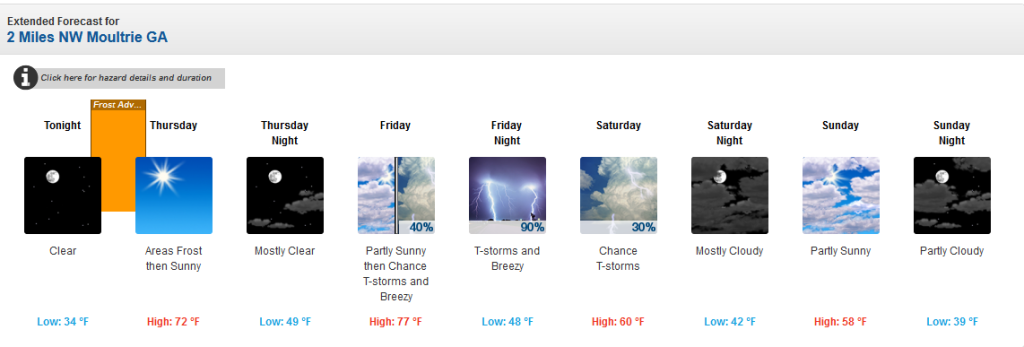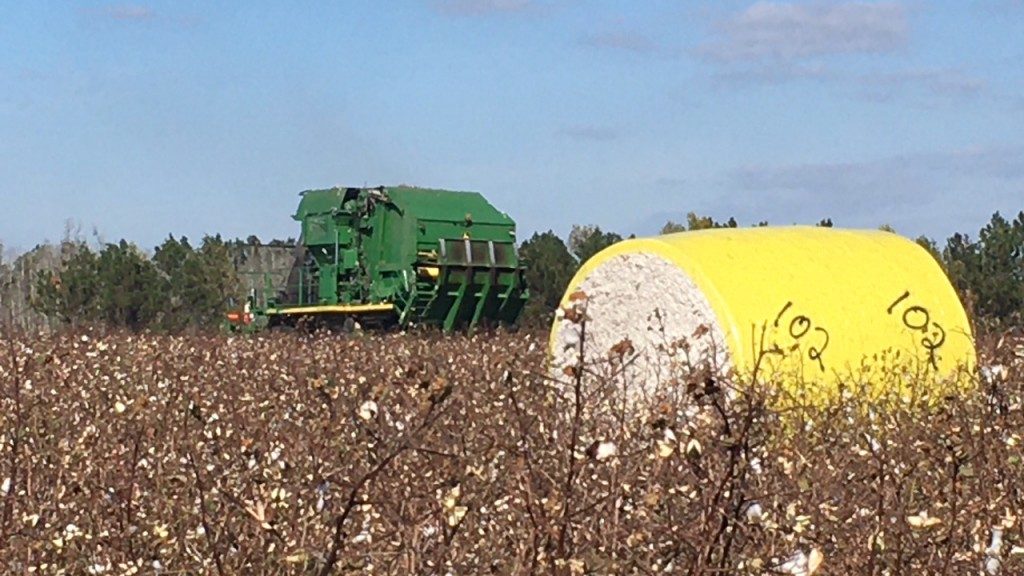Another interesting week in Colquitt County agriculture. Lets go over some of the questions that I have been be getting the last couple of days.
What are the soil temperatures? Cooler weather has been the topic this week. The illustration below shows how the 2, 4, and 8-inch soil temperatures have fluctuated from 6:00 p.m. EDT on March 14, 2023, through 6:00 p.m. EDT on March 15, 2023. This illustration is from the Sunbelt Expo location of the UGA Weather Network.

Below is the 7 day weather summary from the Sunbelt Expo location of the UGA Weather Network.

Cold Weather and Burndowns (Prostko)
Many growers are now in the process of spraying pre-plant burndown herbicides. Low temperatures over most of Georgia are expected to drop below 40 F over the next three days. These temperatures are not very favorable for optimum weed control with herbicides such as Roundup (glyphosate) or Gramoxone (paraquat). Thus, you might want to advise your growers to hold off for a few days until temperatures warm up again (above 40 F but I would prefer warmer). Here is some data to chew on:
1) From some older air temperature research (47 F, 56 F, 65 F, 75 F, and 87 F) conducted by my colleague at Michigan State University, Dr. Christy Sprague:
a) Air temperatures had very little effect on the control of common chickweed with Roundup. However, common chickweed control at lower temperatures was compromised with Gramoxone (only 70% control at 47 F).
b) Air temperature had a significant effect on the control of henbit with both Roundup and Gramoxone. When applied at 47 F, henbit control was < 30% with both herbicides.
2) From Harre et al. (2021) in Weed Technology 35:279-288:
a) Shoot biomass reduction of horseweed and purple deadnettle was 34% and 28% greater, respectively, when paraquat was applied at day/night temperatures of 81/61 F than when applied at 64/55 F.
Corn Planting Dates…
Optimum planting windows will vary based upon your location in Georgia. Corn planting can begin as early as mid-March in South Georgia but may not begin until mid-May in north Georgia. Early planted corn will traditionally out yield late planted corn regardless of region within the state. Delaying corn planting into the summer can dramatically decrease yield potential. Generally speaking, yields decline at a rate of ¾ bushels per day as you progress later in the planting window and can rise to about 2.5 bushels per day when planting after the optimal window. If corn planting is delayed into the summer
yield losses become much more dramatic. Studies in Tifton indicate that stress and disease tolerant hybrids planted under irrigation in late-May to early-June only yield approximately 50% of mid-March to early-April plantings.
In general, corn will emerge between 90 and 120 GDUs (Growing Degree Units) in the spring. After emergence a new leaf collar will appear after approximately 84 GDUs until V10 to V 11. After this stage, new collars will appear approximately every 56 GDUs. The GDUs for Moultrie, GA for the past week (March 7-14, 2023) are shown in the table below. There were between 91 and 98 GDUs accumulated during the period of March 7–14 for 2020, 2022, and 2023. 2021 was cooler during this same period, only accumulating 74 GDUs. Source: UGA Weather Network, Sunbelt Expo location.

How do I calculate GDU’s for corn?
If you want to calculate corn growing degree days for your area, you can use these sites:
For Georgia, https://www.georgiaweather.net. Calculate corn degree days using a base temperature of 50 F and a cutoff temperature of 86 F.
For other areas, use AgroClimate https://agroclimate.org/tools/Growing-Degree-Days/ and use the drop-down menus on the left to choose the appropriate parameters. Note that AgroClimate allows you to choose from four different base temperatures.
Weather forecast for the upcoming week for the Moultrie/Colquitt County area from the National Weather Service.

UGA Pecan Beginners Class & Georgia Pecan Conference (Lenny Wells)
The UGA Pecan Beginners Class will be held this year in conjunction with the Georgia Pecan Conference. The Conference will be held March 28-30, 2023 in Perry, GA. The Beginners Class is held on March 28 and will include the basics of pecan production form start to finish. See below for the complete schedule of topics covered in the Pecan Beginners Class. If you are new to pecan production or simply need a refresher on some of the basics, you can register on-line at the Georgia Pecan Growers Association website. The registration for the course includes a copy of the Southeastern Pecan Growers Handbook and lunch the day of the class.
The main day of the GPGA conference will be March 29 and will include updates from the American Pecan Council, American Pecan Promotion Board, and National Pecan Federation, as well as research topics related to the areas of pecan disease, insect management, and horticulture. The final day, March 30, will conclude the conference with a morning tour of a commercial pecan orchard at Southern Pecan Orchards in Montezuma, GA.
UGA Beginner’s Pecan Production Course
9:00 Welcome
9:10 Cost of Pecan Production
Lenny Wells, UGA Horticulture
9:30 Pecan Varieties
Patrick Conner, UGA Horticulture
10:15 Break
10:45 Pecan Irrigation
Lenny Wells, UGA Horticulture
11:15 Pecan Tree Planting & Establishment
Andrew Sawyer, UGA SE District Pecan Area Agent
12:00 Break for Lunch
Meal Sponsored by Savage Equipment
1:00 Pecan Insect Management
Apurba Barman , UGA Entomology
1:45 Pecan Fertilization
Lenny Wells, UGA Horticulture
2:30 Break
2:45 Pecan Disease Management
Andrew Sawyer, UGA SE District Area Pecan Agent
3:15 Hedge Pruning Pecan Trees
Lenny Wells, UGA Horticulture
3:35 Pecan Weed Control
Andrew Sawyer, UGA SE District Area Pecan Agent
4:00 Pecan Equipment
